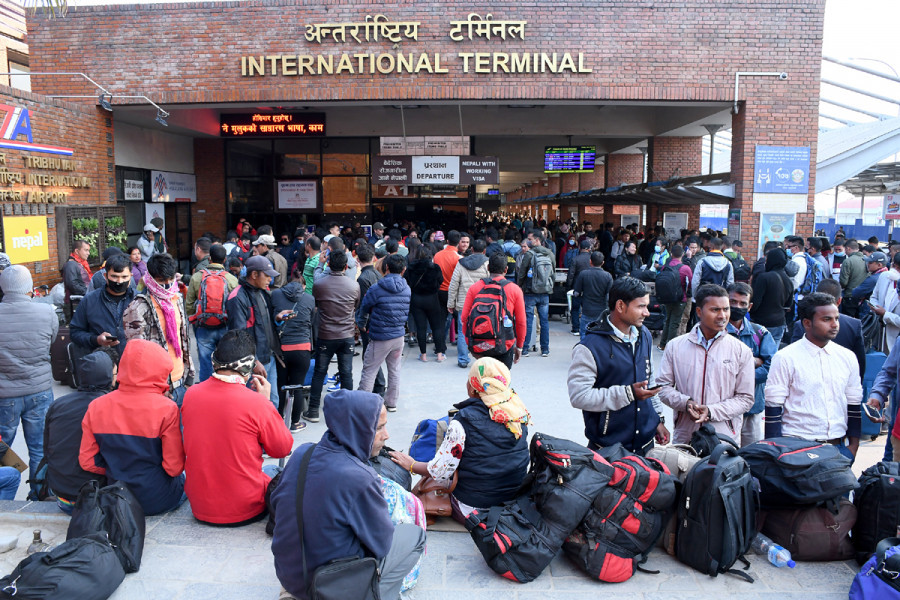National
Small but improving demand for Nepali workers offers hope for foreign employment sector
Hiring of Nepali workers which has remained affected for several months is slowly gaining momentum with labour destination countries gradually opening.
Chandan Kumar Mandal
After several months of complete business shutdown, Yam Bahadur Budhathoki, who is involved in the foreign employment sector, has secured a demand for 300 Nepali workers from Saudi Arabia.
The demand for workers is the first since the Covid-19 pandemic devastated the sector.
Budhathoki has also managed to get some demand for workers from Dubai in the United Arab of Emirates.
“Demands for Nepali workers are slowly resuming with the countries in the Gulf Cooperation Council slowly opening up,” Budhathoki, managing director at Lifeline Overseas Pvt. Ltd told the Post. “The season is good for the demand of workers, but due to the pandemic and fear among the migrant workers, it has been slow this year.”
Workers demand, irrespective of the number, has come as a hope for recruiting agencies, Budhathoki says.
As Covid-19 cases started erupting in the Persian Gulf countries, Malaysia and South Korea—major labour destination countries for Nepalis—the Nepal government stopped issuing labour permits to aspiring migrant workers. As a result, the foreign employment sector came to a halt for several months.
Since the pandemic began, there was no demand for new workers while those already with working visas also could travel because of flight restrictions and lockdowns in Nepal and labour destination countries.
With normalcy slowly returning in labour destination countries, recruiting agencies in Nepal hope for a surge in labour demands in coming months.
The United Arab of Emirates has partially opened for foreign workers. It has started issuing employment visas for government and semi-government sectors, as well as entry permits for domestic workers. Likewise, the Bahrain government has also begun issuing work permits, allowing local employers to hire foreign workers.
“It will still take time for the situation to reach the pre-Covid times. But countries are slowly opening and allowing foreign workers. This is an encouraging sign,” said Budhathoki.
With the foreign employment sector shut for months, Budhathoki had converted his hospitality training institute into a restaurant. He says he is a relieved man after his office started receiving requests from foreign companies for workers.
Buoyed by this development, he is now making plans to send workers to Europe for its hospitality industry once the Covid-19 situation improves.
Nepal Association of Foreign Employment Agencies (NAFEA), the umbrella organisation of recruiting agencies outsourcing workers abroad, is also counting on the situation toimprove in labour destination countries.
“Most of the countries have started issuing visas to the workers which is a good news,” Sujit Kumar Shreshta, general secretary of the agency, told the Post. “With the government decision of resuming labour permits and regular flights, workers have started leaving overseas for jobs as well.”
According to Shrestha, demand for Nepali workers has increased from Saudi Arabia and Dubai.
There’s some obstacles though.
"We have been unable to conduct physical interviews due to the Covid-19 concerns. Also, workers’ demand attestation by Nepali missions abroad has stopped, so there is an obstacle in this regard as well," said Shrestha.
Nepali labour migrant numbers have seen a constant drop in the last few years. The last fiscal year, as a result of the impact of Covid-19, saw a remarkable drop of 27.5 percent in labour permit issuance. Countries like Malaysia, Kuwait and Oman planning to reserve jobs for their citizens has also been a cause for concern for Nepal’s foreign employment sector.
According to Shrestha, recruiting agencies, however, remain optimistic.
“By the end of October, we have estimated that there will be around 100,000-150,000 demands for workers from various countries. Most of these jobs are in the construction sector,” said Shrestha. “Workers who had returned to Nepal due to Covid-19 are also expected to return. It is a sluggish revival, but it’s a positive development.”




 9.83°C Kathmandu
9.83°C Kathmandu














